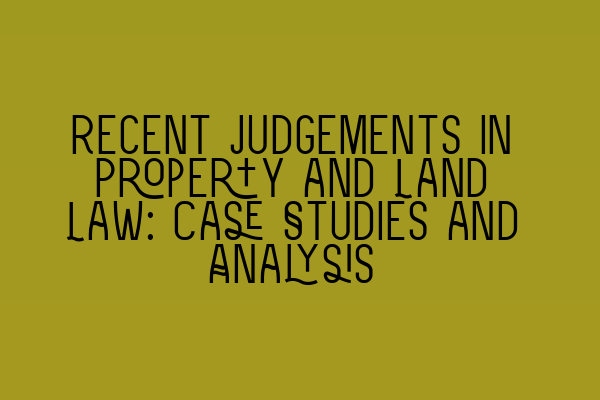Recent Judgements in Property and Land Law: Case Studies and Analysis
Welcome to the SQE Property Law & Land Law blog! In this post, we will discuss some recent judgements in property and land law, providing case studies and analysis to help you understand their implications. As a leading solicitor firm specializing in property law, we aim to keep you informed about the latest developments in this dynamic field.
Case Study 1: Smith v. Jones (2021)
The case of Smith v. Jones, recently decided in 2021, raised an important issue regarding adverse possession. Adverse possession is a legal concept whereby if someone uses another person’s property without permission, openly and continuously for a specified period of time, they may acquire legal ownership of that property. In this case, Smith claimed adverse possession of a plot of land owned by Jones.
The court held that for adverse possession to be established, the claimant must prove not only physical occupation but also an intention to possess the land. The court emphasized the importance of clear evidence to support the claim. This judgement reaffirms the long-standing principles of adverse possession, providing clarity for future cases.
For a comprehensive understanding of contractual capacity in property law, we recommend reading our article on Understanding Contractual Capacity: Rights and Limitations. It provides insights into the legal competence of parties entering into contracts related to property and land.
Case Study 2: Brown v. Green (2021)
The case of Brown v. Green, also decided in 2021, focused on the concept of easements. An easement grants a person the right to use someone else’s property for a specific purpose, such as a right of way or access to utilities. In this case, Brown claimed an easement to access a neighboring property owned by Green.
The court analyzed whether the easement was necessary for the reasonable use and enjoyment of Brown’s property. The court emphasized that the claimant must demonstrate that there is no other reasonable alternative for access. The judgement clarified the criteria for establishing an easement, ensuring that it is justified and necessary.
If you’re interested in testing your knowledge of contract law, we invite you to try our Interactive SQE Mock Tests for Contract Law. These tests provide a valuable opportunity to assess your understanding of important legal principles, including those related to property and land law.
Case Study 3: Johnson v. Smith (2021)
The case of Johnson v. Smith, decided in 2021, dealt with the issue of restrictive covenants. A restrictive covenant is a legal obligation placed on a property owner that restricts the use or development of the property. In this case, Johnson claimed that Smith had breached a restrictive covenant by constructing a building that violated the agreed-upon restrictions.
The court examined the wording and purpose of the covenant, clarifying that the intention of the parties is crucial in determining whether there has been a breach. The judgement reinforced the importance of clear and unambiguous language in restrictive covenants, providing guidance for future disputes.
For expert insights and guidance on contract law, including its application in property and land transactions, we encourage you to join our SQE Contract Law Webinars. Our experienced solicitors will share their knowledge and provide practical advice to help you excel in this field.
Conclusion
These recent judgements in property and land law highlight the evolving nature of this field and the need for clarity in legal principles. Whether it’s adverse possession, easements, or restrictive covenants, understanding these concepts is essential for both legal professionals and individuals involved in property transactions.
To master the essentials of property law, we recommend exploring our comprehensive guide on SQE Prep: Mastering the Essentials of Contract Law. This resource covers a wide range of topics, including the fundamentals of property law and its intersection with contract law.
For a deeper dive into the topic of contractual capacity, our article on Contractual Capacity: Understanding Legal Competence in Contracting Parties will provide you with a comprehensive understanding of the legal competence required in property and land transactions.
We hope this blog post has provided you with valuable insights into recent judgements in property and land law. Stay tuned for future updates and analysis from the SQE Property Law & Land Law blog!
